Comprehensive Guide to Acquiring a Burner Phone
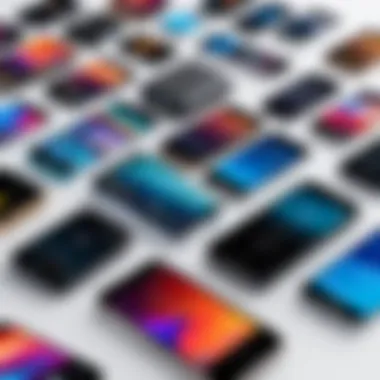
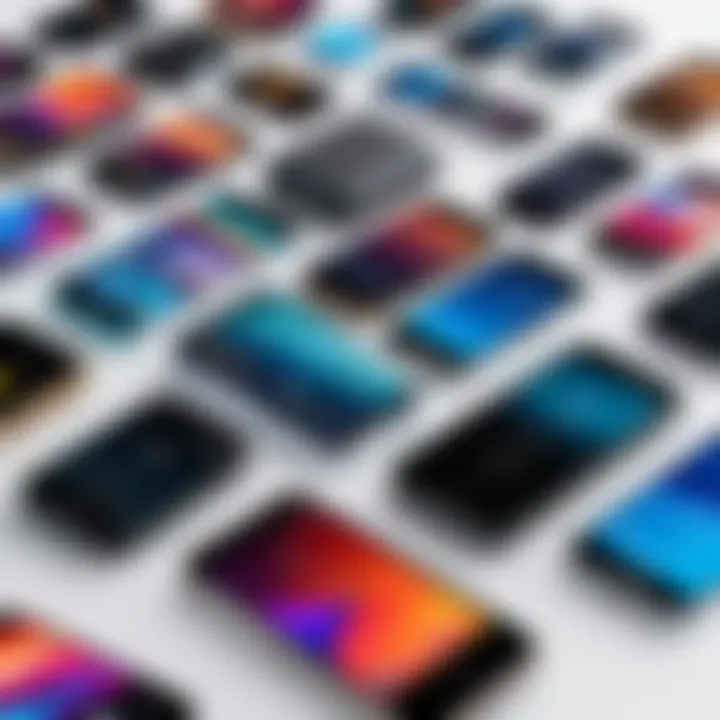
Intro
In an age where privacy concerns loom larger than ever, burner phones have emerged as a topic of interest for many. These disposable phones allow users to make calls and send texts without tying their identity to their communications. Hence, it becomes crucial to understand what they are and how to acquire one safely.
Burner phones serve various purposes, from temporary communication needs to privacy protection. This guide will delve into the intricacies of obtaining a burner phone, offering detailed insights along the way. Readers can expect to learn about the device itself, its key features, and the considerations to keep in mind prior to purchase.
Due to their unique nature, burner phones often lead to misconceptions. Many people associate them solely with illicit activities. However, a more nuanced understanding reveals their legitimate use cases. Whether it is for travel, temporary projects, or simply to separate personal and work life, there are numerous reasons one may choose to buy a burner phone.
The objective here is to equip individuals with comprehensive knowledge about burner phones. We will explore not only how to obtain one but also the legal implications involved in their usage, ensuring a well-rounded perspective on the topic.
Understanding Burner Phones
Burner phones serve a unique role in modern communication. In a world where personal privacy and security are increasingly compromised, understanding these devices can provide insight into how individuals can protect their information. This section clarifies what burner phones are, their various uses, and the distinctions among different types. By grasping these concepts, readers can make informed decisions about whether a burner phone fits their needs.
Definition
A burner phone is typically a prepaid mobile phone that can be disposed of easily after it is no longer needed. This rose as a popular solution for those seeking temporary communication options without the obligations that come with regular phone plans. The essence of a burner phone lies in its disposable nature, allowing users to avoid potential tracking and maintain a degree of anonymity.
Purpose and Uses
Burner phones are often used for diverse reasons. Some common purposes include avoiding long-term contracts or commitments. They cater to individuals who need a secondary line for various situations like travel, dating, or business transactions. Furthermore, these devices are considered useful for high-risk activities that require additional security. People appreciate the flexibility these phones offer in managing personal interactions, as well as protecting their primary contact information.
Types of Burner Phones
Burner phones come in different forms, each suited to specific needs and preferences. Understanding the types can enhance one's ability to choose the right option based on individual situations.
Prepaid smartphones
Prepaid smartphones provide a higher level of functionality with features comparable to standard smartphones. They allow users to experience the capabilities of applications and internet browsing without the commitment of a long-term plan. A key characteristic of prepaid smartphones is that they can be recharged with prepaid minutes or data plans. This flexibility makes them a popular choice for those wanting to avoid being tied to a long contract. However, the initial cost may be higher compared to basic feature phones, as they often come with advanced technology.
Basic feature phones
Basic feature phones prioritize simplicity over advanced technology. Many users choose these for straightforward calling and texting capabilities. The key characteristic of basic feature phones is their affordability, making them accessible for users on a tight budget. They often have extended battery life and practical functionality, a unique feature that appeals to users who want reliable communication without distractions. The downside, however, is the limited features when it comes to internet access or apps, which may not satisfy everyone’s needs.
SIM cards
SIM cards function as the activating agents for mobile phones, providing connectivity to cellular networks. Using a separate SIM card in combination with either a smartphone or a feature phone can serve as a burner phone. This approach allows for the ultimate flexibility, as users can switch the SIM card into various devices as needed. Their primary benefit lies in the ability to have different numbers without necessarily purchasing multiple phones. However, it is crucial to consider compatibility with the chosen device and network. This option may not be as convenient for all users but provides a more customizable pathway to maintaining privacy.
Reasons to Get a Burner Phone
In today's world, privacy and security are increasingly becoming major concerns for many individuals. As technology evolves, so do the risks associated with communication and data sharing. A burner phone offers a solution for those who value anonymity or need temporary communication solutions. Understanding the reasons for acquiring a burner phone can help individuals make informed decisions tailored to their key concerns and circumstances.
Privacy
Privacy is a primary motivator for many who seek out burner phones. These devices are designed to provide a layer of anonymity that traditional phones cannot offer. With increasing incidents of data breaches and privacy violations, an ephemeral phone can protect users from unwanted tracking and surveillance.
For example, individuals wanting to discuss sensitive matters, whether personal or business-related, may turn to burner phones as a precautionary measure. It allows them to communicate without leaving lasting digital traces.
"In an era when personal data is a marketable commodity, maintaining privacy has never been more crucial."
A burner phone is typically pre-paid and often does not require a personal identification number for activation. This lack of personal information linked to the device enhances user privacy significantly. While one should always be cautious with any communication device, burner phones minimize exposure and dependency on conventional network services.
Temporary Communication Needs
There are various scenarios where temporary communication becomes necessary. For instance, when traveling to a foreign country, using a burner phone can alleviate concerns about international roaming fees and contracts. Instead, users can buy a local pre-paid SIM card and enjoy connectivity without the long-term commitment.


Moreover, individuals involved in short-term projects or events might find burner phones quite useful. They allow for establishing communication channels that are specific to the project, preventing any clutter in personal or work-related contacts. Once the project concludes, the phone can simply be discarded or deactivated, keeping personal or business calls distinct and organized.
Security Concerns
Security is a crucial factor for both individuals and businesses. A burner phone can mitigate risks of identity theft and hacking. When potential threats arise, such as stalking or harassment, having a separate line of communication can serve as a barrier.
Burner phones also appeal to those involved in sensitive professional sectors. Journalists, activists, and whistleblowers may require secure communication due to the nature of their work. In these situations, using a burner phone minimizes the potential to trace calls back to them, ensuring a higher level of security.
In summary, the decision to get a burner phone is influenced by a range of factors including privacy, temporary communication needs, and security concerns. Understanding these aspects can guide users in selecting the right burner phone and using it effectively.
Factors to Consider Before Buying a Burner Phone
When considering the acquisition of a burner phone, several important factors influence your decision. Each element plays a significant part in ensuring that the burner phone suits your specific needs. A careful evaluation of these factors will help you avoid potential pitfalls and make a more informed choice.
Cost and Budget
Budget is often the first consideration for many when looking for a burner phone. Depending on your financial situation, you should set a clear limit. Burner phones range from inexpensive basic models to more costly smartphones. For example, a basic model may cost around $20 to $50, while a smartphone can go anywhere from $150 to over $500.
Assess how much you are willing to invest. Additionally, consider ongoing costs such as prepaid plans, which can be manageable or extensive. Some providers offer plans that start at a few dollars per month, while others may charge significantly more. Evaluate your communication needs against the budget to choose the right option.
Network Compatibility
Network compatibility is essential. Different burner phones operate on various carriers like Verizon, AT&T, or T-Mobile. If you already have a preference for a carrier or need the phone for specific coverage areas, ensure the burner phone is compatible with that network. Also, it is worth checking if the phone is unlocked. An unlocked phone will give you the freedom to choose any plan, while a locked phone may restrict your options. This factor greatly affects usability and access to services.
Data and Calling Plans
Understanding data and calling plans is crucial when selecting a burner phone. Depending on your usage requirements, you may need a plan that includes ample data and call minutes. There are many options, including pay-as-you-go and monthly subscriptions. Pay-as-you-go options can be great for minimal usage, allowing flexibility and avoiding long-term contracts. Typically, you can add funds as needed. If you anticipate frequent usage, consider exploring monthly subscription plans that offer better rates for extended use. Evaluate your needs carefully and select a plan that aligns with your budget and anticipated usage patterns.
Always check for hidden fees or conditions in the plans and contracts.
Methods for Acquiring a Burner Phone
Acquiring a burner phone is a crucial step for those who prioritize privacy and temporary communication. This section outlines several methods for obtaining one, including visits to retail locations, online purchases, and second-hand options. Each method has its advantages and disadvantages, which we will explore to help you make an informed decision.
Retail Locations
Shopping at retail locations provides a traditional approach. When you visit a local store, you can immediately access a variety of burner phones. This option allows for direct interaction with the product, which can help ensure that you choose a phone compatible with your needs. Notable retailers such as Walmart or Best Buy usually have a selection of prepaid smartphones and basic feature phones.
Benefits of buying in-store include instant availability and the opportunity to ask questions from sales staff. Also, many times, you can purchase a prepaid SIM card directly, simplifying the setup process. However, one must consider that physical stores may have limited stock and may not offer the best pricing compared to online options.
Online Purchases
Buying a burner phone online offers several advantages. Websites like Amazon and eBay provide extensive choices. Users can read customer reviews and compare prices easily, often leading to lower costs. This method is especially beneficial for tech-savvy individuals, as it allows for in-depth research prior to purchase.
When buying online, consider delivery times. While you might find a great deal, waiting for shipping can be a downside. Furthermore, always check the seller's ratings to avoid scams. The online route is ideal for those seeking specific models or brands, which might not be available locally.
Second-Hand Options
Second-hand options can be an economical way to acquire a burner phone. People often sell their unused devices online through platforms like Craigslist or Facebook Marketplace. Purchasing a used phone can save money and allow you to obtain a better model at a lower price.
However, caution is essential. Ensure the device is functional and not locked to a previous carrier. Always meet in a public space when conducting transactions to maintain safety. This method appeals to those looking for sustainability in their choices, as reusing phones reduces electronic waste.
In summary, deciding on the best method for acquiring a burner phone involves considering your personal preferences, budget, and urgency. Whether you choose retail, online purchases, or second-hand options will influence your overall experience.
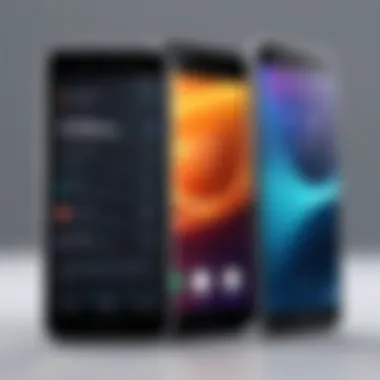
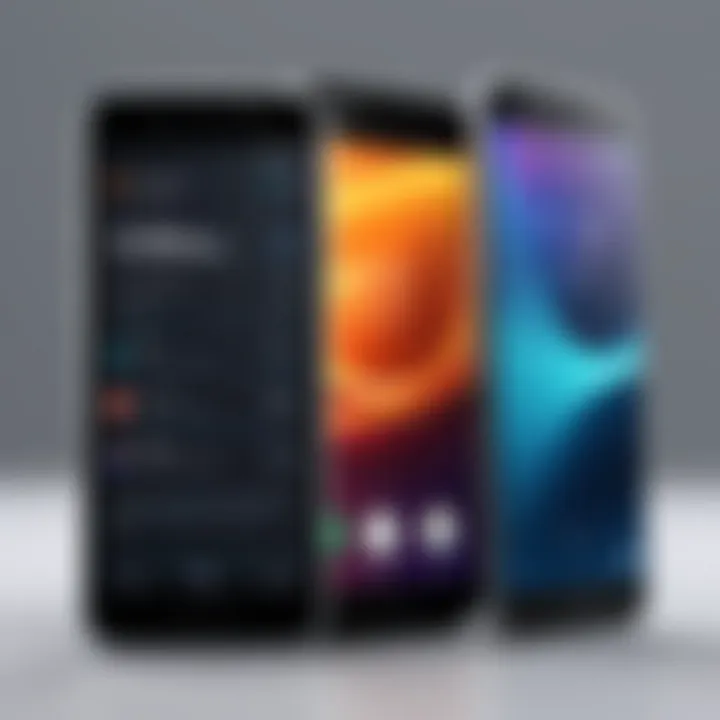
Setting Up Your Burner Phone
Setting up your burner phone is a vital aspect of utilizing this tool effectively. The process not only defines how secure and practical your burner phone will be but also determines how well it aligns with your privacy and communication needs. Failing to understand the key steps of setup might compromise your security or lead to inefficient use of your burner phone.
Activation Steps
The activation of your burner phone usually involves a series of straightforward actions, but these must be executed carefully. First, ensure that you have your phone and the SIM card that comes with it. To activate your burner phone, insert the SIM card into the device. After that, power on the phone. Most prepaid or burner phones will prompt you to activate your service as soon as they are turned on.
You may need to call the provided customer service number or visit a specific website for activation. During this phase, you will typically need to provide personal information, such as your name, address, and payment details, depending on the plan you choose. While this may seem counterintuitive in a device aimed at maintaining anonymity, some services require minimal identification for regulatory reasons. Take care to verify your chosen provider’s privacy policies to understand how your information will be handled.
You should also ensure that the phone's settings are adjusted to prevent any automatic data syncing with cloud services. This step is crucial to maintain privacy. Additionally, do not link your burner phone number to any existing accounts that may reveal your identity.
Choosing a Plan
Selecting a plan for your burner phone is a decision that can have significant consequences for how you use the device. Various mobile providers offer different plans, from pay-as-you-go options to monthly subscriptions. Evaluate your communication habits carefully to choose the right plan.
- Short-term Needs: If you only require the phone for a brief period, a pay-as-you-go plan is usually sufficient. This type of plan allows you to buy minutes or data as needed without ongoing commitments.
- Long-term Usage: For extended usage, consider monthly plans that offer a certain amount of data or minutes for a flat fee. These can save money over time if you plan to use the device frequently.
- Data Requirements: Analyze how much data you’ll need. If you plan to use the phone primarily for calls and texts, a minimal data package may suffice. However, if you intend to access the internet or use apps, select a plan that offers ample data.
Keep in mind that some providers might collect user data to craft personalized plans. Always read the fine print to identify what information is collected and how it is used.
Maintaining Anonymity
Anonymity is one of the primary reasons for acquiring a burner phone, yet it requires ongoing effort to uphold. After activation and plan selection, ensure your practices align with your need for privacy. Here are several strategies to help maintain anonymity:
- Avoid Personal Details: When registering the burner phone, provide the minimal information required. If possible, do not use your real name or address.
- Payment Methods: Use cash rather than credit or debit cards when buying the phone or adding credits. This reduces the chance of ties back to your personal information.
- Limit Communication: Use the burner phone solely for specific purposes. Avoid linking it to your primary accounts or sharing the number widely.
- Use Encrypted Apps: When engaging in sensitive communications, utilize apps that offer end-to-end encryption to further enhance privacy.
Each of these practices enhances the effectiveness of your burner phone for temporary or private communication, allowing for a versatile approach to privacy management.
"Setting up a burner phone properly can amplify security and ensure that your private communications remain just that: private."
Taking the time to set up your burner phone thoughtfully can make a considerable difference in how it serves you. Start with the activation process, choose your plan wisely, and remain vigilant about maintaining your anonymity.
Legal Considerations
Understanding the legal aspects of burner phones is crucial for any potential user. The laws regulating prepaid devices, including burner phones, vary significantly across different jurisdictions. This section delves into the important regulations and potential risks involved when using these phones, ensuring you are well-informed before making a purchase.
Regulations on Prepaid Phones
In many countries, prepaid phones are subject to specific regulations aimed at preventing illegal activities. For example, in the United States, the Federal Communications Commission (FCC) mandates that providers collect identifying information when selling prepaid phones. This includes the buyer's name and address. These rules help in tracking the ownership of the phone if it is used in a crime.
The significance of these regulations cannot be understated. They are designed to strike a balance between consumer privacy and law enforcement objectives. In some jurisdictions, you may find that buying an anonymous burner phone is becoming increasingly difficult due to these rules. Notably, some retailers may request identification, which can defeat the purpose of anonymity that burner phones often provide. Therefore, those considering using a burner phone must be aware of their local laws and regulations.
Potential Risks of Misuse
While burner phones serve many legitimate purposes, they can also be misused for illegal activities. This has led to a stereotype that burner phones are primarily tools for criminal behavior. Authorities monitor unusual patterns of usage, and suspicious activities can draw attention.
Some of the risks associated with using a burner phone include:
- Legal Consequences: Engaging in illegal activities can result in prosecution, regardless of the device used. Burner phones offer no immunity from the law.
- Increased Scrutiny: Frequent changes of phone numbers or patterns of high usage can trigger investigations. Law enforcement agencies often scrutinize transactions related to burner phones.
- Privacy Risks: While they aim to provide anonymity, in reality, it is still possible for law enforcement or other agencies to trace usage back to individuals, especially if the phone is not purchased discreetly.
Ultimately, while the utilization of a burner phone can be a means to secure privacy or fulfill temporary communication needs, caution must be exercised to ensure compliance with the law. Understanding both the regulations and the potential misuse of these phones will help you navigate their usage responsibly.
Best Practices for Using a Burner Phone
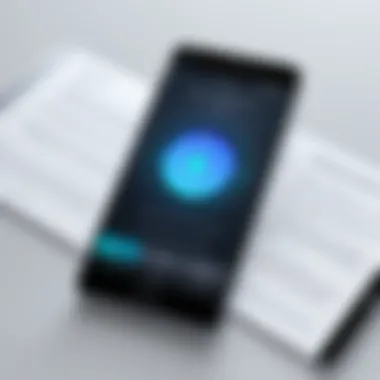
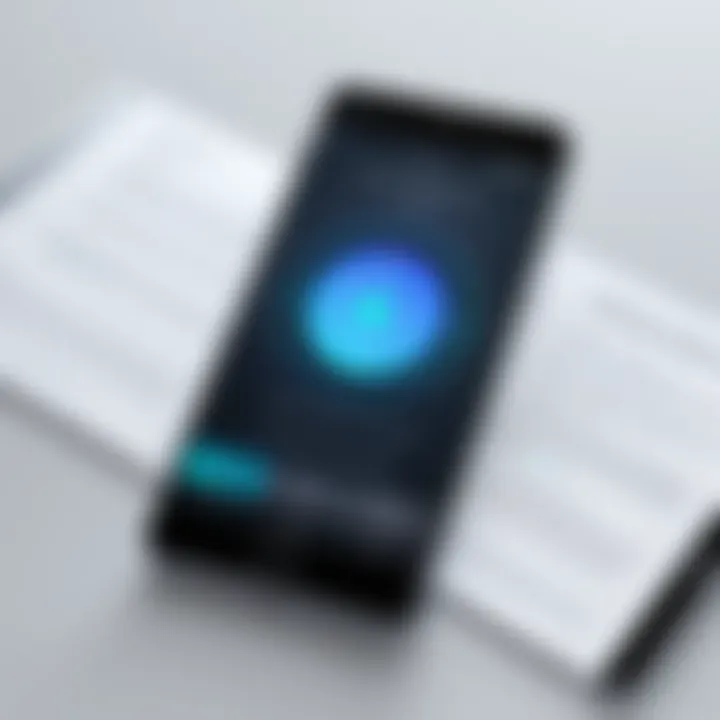
When it comes to burner phones, knowing how to use them wisely is essential. Such phones are designed for short-term use and can greatly enhance your privacy and security. Understanding best practices ensures that you get the most out of your burner phone and minimize potential risks associated with its use.
Limiting Usage Duration
One key practice is limiting the duration of usage. Burner phones are often meant for temporary communication needs. If you use a burner phone as your primary device for an extended period, it defeats the purpose of maintaining anonymity.
Consider these points:
- Determine the purpose: Clearly define why you need the burner phone. Are you traveling? Engaging in a temporary business deal? This clarity helps you set a timeframe.
- Set a timeline: Once your need concludes, immediately discontinue usage.
- Dispose of responsibly: After using the phone, consider proper disposal. Many retailers offer recycling options for electronic devices.
By limiting the duration, you enhance your privacy. A consistent, temporary usage pattern decreases the chances of your identity linking back to the burner phone.
Safeguarding Information
The second best practice emphasizes safeguarding your personal information. Though burner phones offer an additional layer of privacy, they still require responsible handling. Here are some strategies to protect your data:
- Avoid linking personal accounts: Do not connect social media or email accounts to the burner phone. Doing this can expose your identity.
- Use disposable apps: If communication is needed, consider using applications that offer self-destruct features after messages are read. Services like Signal or Telegram can help in these scenarios.
- Regularly change numbers: If you rely on a burner phone for communication, consider changing the number periodically. This prevents long-term tracking.
Safeguarding your information is not just about privacy. It is also about protecting against potential threats in the digital landscape.
Implementing these best practices not only maximizes the intended use of a burner phone but also aligns with a broader strategy of maintaining digital privacy. Following these guidelines can lead to a more secure experience while using temporary devices.
Common Misconceptions
Understanding common misconceptions regarding burner phones is crucial for both potential users and the general public. Misunderstandings can lead to misinformed decisions about usage and purchasing. It is essential to address these misconceptions with clarity to facilitate informed choices and sensible applications of burner phones.
Burner Phones and Illegal Activities
A prevalent misconception is that burner phones are exclusively tools for criminal activities. This view stems from the portrayal of these devices in the media, where they are often linked to illicit dealings. However, this perspective neglects the legitimate purposes that burner phones serve.
Many users acquire burner phones for reasons such as maintaining privacy during travel, managing temporary assignments, or safeguarding personal information during sensitive communications. In fact, various professions advocate for the responsible use of burner phones to protect clients' and employees' information.
Moreover, while it is true that certain individuals misuse these devices to obscure their identity and evade law enforcement, this should not diminish the legitimate functions that many users explore. It’s important to recognize that any technology can be misused, and the focus should instead be on the varied applications and the ethical considerations that accompany them.
Ultimately, understanding that burner phones can have both positive and negative uses can help unravel the stigma around them.
Performance Expectations
Another common misconception is that burner phones compromise performance in comparison to conventional smartphones. It is true that many burner phones are basic in their functionality; however, this does not necessarily equate to poor performance. The expectations of performance should align with the intended use of the device.
For short-term use cases or basic communication, many burner phones deliver adequate performance. Devices like the Nokia 105, for example, provide reliable calling and texting capabilities without frills. Prepaid smartphones can also offer satisfactory performance for various apps and internet use, provided they are chosen based on network compatibility and data plan specifics.
It's paramount for users to evaluate their needs before assuming that a burner phone is unfit for purpose. For individuals seeking basic functionality or anonymity, a burner phone typically meets those needs sufficiently well.
Addressing these misconceptions helps potential users understand the practical value of burner phones, ensuring they are better equipped to make informed choices.
Finale
In this comprehensive guide, we have navigated through the various aspects and nuances surrounding the acquisition of a burner phone. Understanding the definition, purpose, and varied types of burner phones has laid the groundwork for appreciating their relevance in today’s digital landscape. As privacy and security become paramount concerns for many, the necessity of having a temporary communication device stands out. The discussions on reasons to acquire a burner phone, including its application in maintaining anonymity and addressing security concerns, underscore its practical value.
Considerations such as cost, network compatibility, and data plans are paramount when making such a purchase. Knowing where and how to get a burner phone can save not only time but also unnecessary expenses. The distinction between retail, online, and second-hand options provides consumer flexibility. Legal considerations highlight the importance of using these devices responsibly to avoid potential pitfalls.
Best practices emphasize maintaining user discretion and safeguarding personal information. Simultaneously, debunking common misconceptions about burner phones is essential for anyone looking to utilize such devices without stigma or misunderstanding.
This conclusion serves as a reminder of the integral role burner phones can play in safeguarding one's privacy. It is crucial for users to weigh the benefits and responsibilities that come with using such technology. The guide reinforces the idea that, when used appropriately, a burner phone can be a powerful tool for maintaining communication under chosen conditions. As technology keeps evolving, consumers should remain informed and empowered to make decisions that best suit their needs.
"Understanding the framework of burner phone usage is as critical as the decision to acquire one. It offers insight into staying private and secure in an interconnected world."
In summary, a burner phone can be a solid choice for those who value privacy, need temporary communication, or wish to avoid digital traces. By following this guide, individuals can navigate the process with confidence and clarity.



